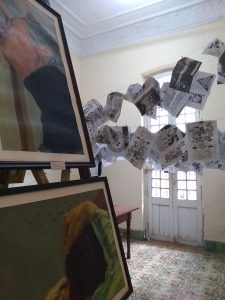
Exhibition at a back-garden arts festival. On the line are pamphlets published by a Cuban writing collective.
Control y contestación: el mundo paradójico de los libros en Cuba
Creo que los libros de otro país nos pueden enseñar mucho de una cultura extranjera. O, mejor dicho, el mundo literario – la librería, la casa editora – nos dice algo de los valores y la política de una sociedad. Y quizá no hay un lugar de que esto se puede decir con más certeza que Cuba.
Empiezo con mi primera visita a una librería cubana, la Librería Alma Mater.
Se ubica en la intersección de dos carreteras importantes: donde se cruzan la Calle Infanta y la Calle San Lázaro. La anterior pasa desde el mar hacia arriba, por una ruta poblada de empresas locales y nacionales, bares y cafeterías, conectando Vedado con Centro Habana como una columna vertebral. La otra se enchufa directamente a la Universidad de La Habana, y desde allí se despliega como un cable paralelo al Malecón, arrojándose en el paseo marítimo de la Habana Vieja. Entre estas dos calles, la Librería Alma Mater yace en un lugar históricamente y culturalmente central, aunque la apariencia del edificio no sugiere nada de esto. Tanto adentro como afuera, la librería destartalada parece desnuda. Pocas novelas existen entre los puestos de libros de texto estrictamente académicos.
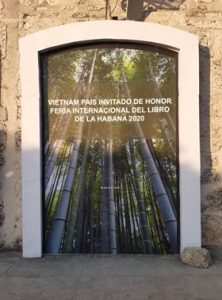
‘Vietnam, Guest of Honour, Havana International Book Fair, 2020’
Así un día, entro y no puedo encontrar casi nada de ficción, y le pregunto a un trabajador si hay una obra de Norberto Fuentes, un escritor cubano cuyo cuento acabo de leer. Me explica que, de Norberto Fuentes, no tienen nada. “¿Por qué?”, inquiero. “Porque Fuentes no es permitido,” me responde. “Pero Fuentes apoyaba la Revolución, ¿no? Leí su cuento ‘El Capitán Descalzo’, que se trata de un revolucionario.” “Sí que la apoyaba, pero después al régimen él le cayó mal.”
Así una frase sencilla oculta una historia oscura y nebulosa sobre los desacuerdos personales e ideológicos, a la vez que suma todo lo que se necesita saber en el instante: que, al régimen, Fuentes le cayó mal. Por eso, durante mi primera experiencia con los libros en Cuba, el país me parecía como un circuito cerrado de ideas.
Esto pensaba hasta mi segunda visita a la Librería Alma Mater, sólo unos días después. Fui a la librería porque se vendían billetes de entrada para la Feria Internacional del Libro de La Habana. Después de obtener unos billetes, me di cuenta de que pasaba algo en un salón contiguo al fondo de la tienda. Fui a averiguar lo que estaba ocurriendo.
Había una exposición de fotografía estudiantil, pequeña pero popular, y, como todos los eventos buenos en Cuba, estaban repartiendo el ron libremente. (Esta fue mi primera vez probando el ron en Cuba y exclamé, “Ayy, ¡qué fuerte es!” Un artista me corrigió: “De hecho, es muy débil. Pero bueno.”) Una fotógrafa se me introdujo y me llevaba por la exposición, introduciéndome a otros artistas. Dos piezas me asomaron: una en que el cuerpo del modelo se había oscurecido para evitar una identificación concreta de su género (si tenía una); y otra en que un muelle habanero se bordeaba con alambre de espino.
Hablé con los artistas y me dijeron que se sentían seguros de expresarse en la librería. Me sorprendía ver una foto sobre la dificultad de salirse de Cuba – que queda un gran desafío por razones económicas, políticas, y burocráticas – expuesta en un país donde la unidad indisoluble de la nación sigue siendo la clave de la legitimidad del régimen; y aún más en una librería donde me prohibían comprar la obra de un escritor que delató su patria cubana.
Otro día fui a una reunión con una profesora donde trabajaba, en la Casa de Las Américas. Haber recientemente acabado con un libro de cuentos de Julio Cortázar, uno de mis escritores favoritos de América Latina, me emocionaba ver que, adjuntada a la casa editora famosa, había una librería que se llamaba ‘Rayuela’ (el nombre de la obra maestra de Cortázar). Después de hacer un pequeño tour del edificio, entré en la Librería Rayuela con emoción de encontrar el tesoro literario que había visto fijado en las paredes de la Casa de Las Américas.
Sin embargo, por todos lados, en todos puestos de esta pequeñita librería, había sólo libros de Che y de Fidel (y unos de cocina). No podía ver absolutamente nada de Cortázar. Por eso, tuve la siguiente conversación con el viejo dependiente detrás del mostrador:
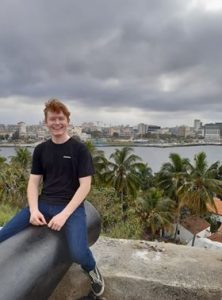
At the Havana International Book Festival, held in the Morro Castle.
Yo: “Hola, señor, ¿tienen ustedes algo de Cortázar aquí?”
El señor: “No.”
Yo: “¿Ni un libro de cuentos ni nada?”
El señor: “No, de Cortázar no tenemos nada.”
Yo: “¿Han tenido algo de él en el pasado?”
El señor: “No, nunca hemos tenido nada de Cortázar. Ni nunca tendremos nada de Cortázar.”
Yo: “Pero la librería se llama ‘Rayuela’, el nombre de una novela de Cortázar. ¿Por qué se llama así si no les interesa vender sus obras?”
El señor: “Porque Cortázar pasaba mucho tiempo en la Casa de Las Américas, comunicando con la gente aquí. A él le gustaba mucho la Casa.”
Yo: “Pues entonces porque no venden nada de él?”
El señor: “Porque no se vende. Pero lo conocía.”
Yo: “¿¡En serio!? ¡Qué chévere! ¿Cómo era?”
El señor: “Ohhh pero fue muy serio. Un hombre muy, muy inteligente. Pero muy serio. Un día me vino y me preguntó dónde estaban las bicicletas.”
Yo: “Ay bueno. ¿Lo conocías bien?”
El señor: “Noo, no. Realmente solo lo conocí esta única vez. Y me preguntó sobre las bicicletas.”
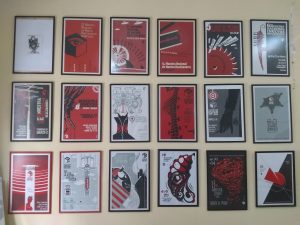
Not books, but paradoxical nonetheless. Every year the ICAIC, the Cuban state cinema production company, holds a cinema festival (promoted by the posters) which the state then attempts to shut down for its subversive content. (Yes, the state-run organisation holds a festival shut down by the state.) So organisers of the event publicise one date in the posters then hold the festival on another. The new date is sent out over text.
Podría ir relatando más de mis experiencias literarias casi paradójicas en Cuba – como la Feria Internacional del Libro, donde las obras más populares analizaban la historia dentro de un marco teórico del materialismo dialéctico, y donde los jóvenes andaban por todos lados tocando música en bocinas y actuando como si fueran los protagonistas de sus propios videos musicales de Reggaetón – pero creo que basta lo que he escrito. Para mí, muestra una gente que lleva vidas de contradicción, en un país puramente contradictorio; una gente que siempre está probando los límites del régimen, a la vez que se los acomodan pacíficamente, en un país que se escapa de las definiciones rígidas, y que no se puede entender desde detrás de una pantalla.
English
I believe that the books of another country can teach us a lot about a foreign culture. Or rather, the literary world of a society – the bookshop, the publishing house – tells us something of its values and politics. And there is perhaps no other place about which this can be said with greater certainty than Cuba.
I will begin with my first visit to a Cuban bookshop, the Alma Mater Bookshop.
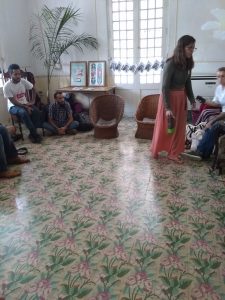
A poetry cafe held privately by a Cuban writing collective.
It is located at the intersection of two important roads: where Infanta meets San Lázaro. The former starts from the sea and stretches upwards, through a route populated by local and national businesses, bars and cafes, connecting Vedado and Central Havana like a spine. San Lázaro, meanwhile, plugs directly into the University of Havana and from there unspools like a cable parallel to the Malecón, dumping out at the seafront of Old Havana. Between these two streets, the Alma Mater Bookshop finds itself in a place that is both historically and culturally central, although the building’s appearance suggests nothing of the sort. As much inside as outside, the dishevelled shop appears bare. Few novels exist between the stands of textbooks – strictly academic.
One day, I go in and find almost no works of fiction, so I ask a worker whether there is anything by Norberto Fuentes, a Cuban writer whose short story I had just finished reading. He explains to me that they have nothing by Norberto Fuentes. “Why?”, I enquire. “Because Fuentes is forbidden,” he responds. “But Fuentes supported the Revolution, right? I read his story, ‘The Barefoot Captain’, which is about a revolutionary.” “Yes, he did support it, but later he fell afoul of the regime.”

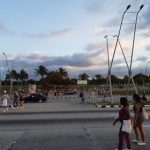
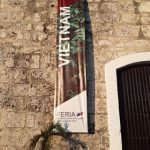
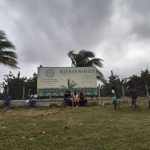
Like this, a simple phrase hides a dark and nebulous story about personal and ideological disagreements, at the same time as it sums up all of the information necessary at that moment: that Fuentes fell afoul of the regime. So, during my first experience with books in Cuba, the country seemed to me a closed circuit of ideas.
I thought this until my second visit to the Alma Mater Bookshop, just a few days later. I went to the bookshop because they were selling tickets for the Havana International Book Festival. After obtaining a few tickets, I became aware of something going on in the adjoining room at the back of the store. I went to have a look at what was happening.
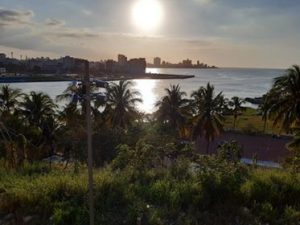
View from the Morro Castle on a sunnier day of the Havana International Book Festival.
There was an exhibition of student photography, small but popular, and, like all good Cuban events, they were freely handing out rum. (This was my first time trying rum in Cuba and I exclaimed, “God, this is strong!” An artist corrected me: “Actually, this is very weak. But never mind.”) A photographer introduced herself to me and led me around the exhibition, introducing me to other artists. Two pieces stuck out to me: one in which the model’s body was obscured in order to hide any concrete identification of their gender (if they had one); and another in which the view of a Havana dock was framed by barbed wire.
I talked with the artists and they told me that they felt safe to express themselves in the bookshop. It surprised me to see a photo about the difficulty of leaving Cuba – which remains a big challenge for financial, political, and bureaucratic reasons – displayed in a country where the indissoluble unity of the nation continues to be the key to the regime’s legitimacy; and even more in a bookshop where I was prohibited from buying the work of an author who betrayed his Cuban homeland.
Another day I went to a meeting with a teacher where she worked, in the Casa de Las Américas. Having recently finished a book of short stories by Julio Cortázar, one of my favourite Latin American authors, I was excited to see that, attached to the famous publishing house, there was a bookshop called ‘Rayuela’ (the name of Cortázar’s magnum opus). After touring the building, I went into the Rayuela Bookshop, excited to find the literary treasure that I had seen fastened to the walls of the Casa de Las Américas.
However, on all sides, on every stand in the little bookshop, there were only books about Che and Fidel (and a few about cooking). I could see absolutely nothing by or about Cortázar. So, I ended up having the following conversation with the old shopkeeper behind the counter:
Me: “Hello, sir, do you have anything by Cortázar here?”
The shopkeeper: “No.”
Me: “Nothing? Not even a book of stories?”
The shopkeeper: “No, we have nothing by Cortázar.”
Me: “Did you have some of his stuff in the past?”
The shopkeeper: “No, we have never had anything by Cortázar. Nor will we ever have anything by Cortázar.”
Me: “But the bookshop is called ‘Rayuela’, the name of a book by Cortázar. Why is it called that if the bookshop is not interested in selling his works?”
The shopkeeper: “Because Cortázar spent a lot of time in the Casa de Las Américas, communicating with the people here. He liked it a lot here.”
Me: “Okay, but why do you not sell anything by him?”
The shopkeeper: “Because we don’t sell it. But I knew him.”
Me: “Really?! That’s amazing! What was he like?”
The shopkeeper: “Ohhh he was very serious. A very, very intelligent man. But very serious. One day he came in here and asked me where the bikes were.”
Me: “Oh okay. Did you know him well?”
The shopkeeper: “Noo, no. Actually, I just met him the once. And he asked me about the bikes.”
I could go on listing more of my almost paradoxical literary experiences in Cuba – like the International Book Festival, where the most popular works analysed history within a framework of dialectical materialism, and where young people walked around everywhere playing music on speakers and acting as if they were the stars of their own Reggaeton music videos – but I think that what I have written is enough.
For me, it shows a people that lead lives of contradiction, in a wholly contradictory country; a people that are always testing the limits of the regime, at the same time as they accommodate it peacefully, in a country that escapes rigid definitions, and which cannot be understood from behind a screen.
